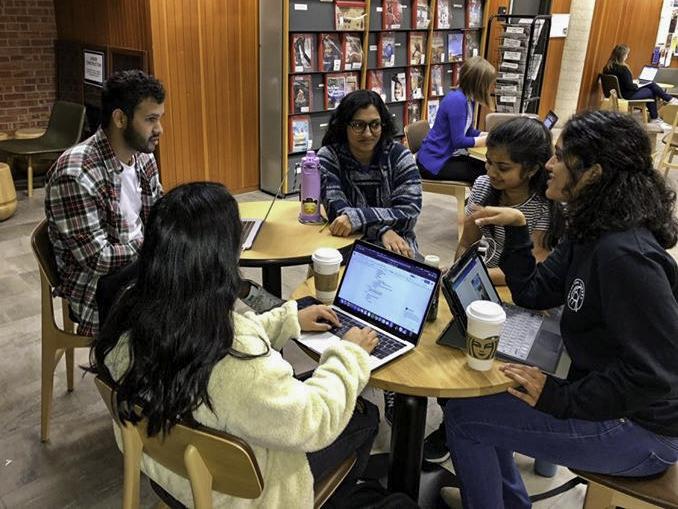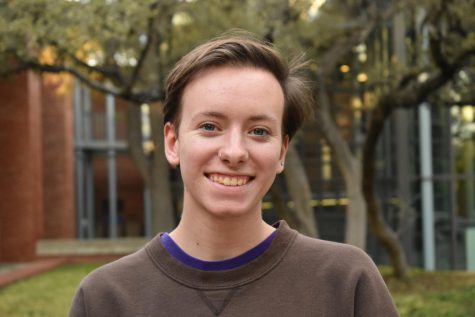Photo by Martina Almeida
At the first South Asian Student Association (SASA) meeting of the semester, members unanimously voted on a constitutional amendment that would transform the officer election process: only SASA members can run for positions, candidates can give live speeches and only SASA members will vote. Although passing the amendment was easy, getting there wasn’t.
The way the elections were run last semester and the years prior, according to senior and former SASA president Natasha Muppala, included a week for all Trinity students to nominate candidates followed by a week for all Trinity students to vote for officer positions.
“There was no way to specifically limit [the election] to a few people because in our constitution, a member was just anyone who attends SASA events or has interest in the South Asian culture, so that could literally apply to anyone,” Muppala said. “And that they are a Trinity student, which is why for the past four years now that I’ve been at Trinity, that’s how the elections have been run.”
However, not everyone agreed that’s how elections should continue. Sophomore Jahnavi Nikkam, former SASA secretary, was one of the students pushing for changes to the election process last semester. Nikkam said she and others in SASA wanted to make the elections more transparent, making it so only SASA members can run, allowing candidates to give speeches and have voting take place in person, also only by SASA members.
“The backlash that SASA had received [was] about how there was no transparency in the election process, how everybody on Trinity’s campus could vote for an organization that they weren’t really a part of,” Nikkam said. “It’s like having the U.S. leaders being voted into office by the whole world. It doesn’t make sense.”
Nikkam had created a GroupMe group chat for South Asian students on campus earlier in the semester in the hopes of creating a broader community outside of SASA. Muppala said it became a conduit for SASA information eventually because of its convenience having about 80 people communicating in one place. However, she said this caused problems when the election rolled around because not all people in the group chat participated in SASA regularly, and there were also non-South Asian SASA members who weren’t in the group chat.
In this group chat and in personal conversations, according to Nikkam, many students began thinking of amendment proposals to change the election process. The SASA constitution states that amendments must be proposed in writing to the president to then be voted on during the next regularly scheduled meetings. According to Muppala, this is where communication in the group broke down.
Muppala said she hadn’t received any emails with amendment proposals before the election started that would allow the board to change the process, but according to Nikkam, SASA members couldn’t access the constitution on their own. To get the constitution, they could either request it from Muppala or directly from Shannon Twumasi, coordinator of student programs. SASA also wasn’t having the regularly scheduled meetings the constitution required.
“How can we know what we can amend if we don’t even know what’s in the constitution because it’s not available for all SASA members to see?” Nikkam said. “So, we requested to see the constitution and everything like that, and near the end of elections I believe, we finally got a copy of the constitution from not a SASA board member, just another South Asian on campus.”
Muppala said the constitution wasn’t in an accessible place because of how loose SASA membership is, so she sent it to people upon request. Twumasi said she gave the constitution to a few SASA members who requested it. She also recommends that all student organizations have their constitution as on-hand as possible because it gives organizations autonomy.
“Student [organizations] change all the time,” Twumasi said. “Student leadership sometimes might see something that doesn’t work for their organization anymore, and so ultimately we want their constitution to reflect what they’re doing. So, if it’s something different, we encourage them to look at it and follow their amendment process.”
According to sophomore Meghan Muppala, current president, people were texting in the group chat late at night right before and during the election asking for the constitution, so often texts were lost in the shuffle or officers couldn’t respond until the next day. Nikkam attempted to schedule a SASA general meeting before the election to discuss amendment proposals, but it was cancelled because it wasn’t proposed to the board for approval, the standard process for scheduling meetings and events.
Natasha finally received an amendment proposal that would make the election a clearer cut process for only SASA members, but she received it too late — on the first day of the election. After outcry from the South Asian community on campus to annul the incoming votes in order to change the process, Gregory Clines, SASA adviser and assistant professor in the Department of Religion, sent an email to all Trinity students saying that the election would continue as planned.
“It is a condition of remaining in good standing with the university’s student life office that organizations follow the rules they set out,” Clines wrote in an email the day after the election form was sent out. “I will also point out that the constitution is what gives everyone with interests in the group the right to be heard in the first place.”
After the election, former and new officers held a general meeting. They discussed highlights of first semester and allowed people to propose amendments. After much discussion, Meghan said no concrete proposal was made.
Over winter break, she and the newly elected board combined the community’s concerns for the next election and created an amendment that would change elections to include speeches by candidates at a general meeting, a question and answer with candidates and members and a SASA member-only vote. Meghan said there isn’t a standard process to distinguish membership beside other SASA members and officers vouching for their regular participation in the organization. The amendment was passed unanimously at the first general meeting of the semester in January.
Nikkam said she and the SASA members she advocated for felt unheard in their attempt to transform the election process for the sake of keeping things the way they had always been. Aside from the election, she had also pushed for more diversity in SASA events because, as of last semester, SASA only held Hindu events that don’t represent all people of South Asian backgrounds. Regarding this, she said the other officers weren’t willing to collaborate to make her ideas happen.
According to Natasha Muppala, there were plans to collaborate with Muslim Student Association for a dialogue on Kashmir as well as plans for an international prom put together by all Trinity’s cultural organizations, but the events didn’t happen either due to lack of communication or logistical reasons. Meghan said she hopes to broaden SASA’s spectrum of South Asian events through newly established general meetings and socials where people can hang out and get to know each other and their backgrounds.
With these plans in motion, a new amendment finally in the books for the next election and officially unaffiliating with the South Asian GroupMe to avoid organization drama through social media, the SASA board is ready to move forward.
“We’ve planned a bunch of stuff, we’ve listened, we’re having a bunch of general meetings and events, so we’re trying to move on from [the election],” Meghan said. “I’m hoping that these people, or the people who weren’t happy last year, will still show up and see that we’ve made changes and we’re trying to foster this good environment for people.”














